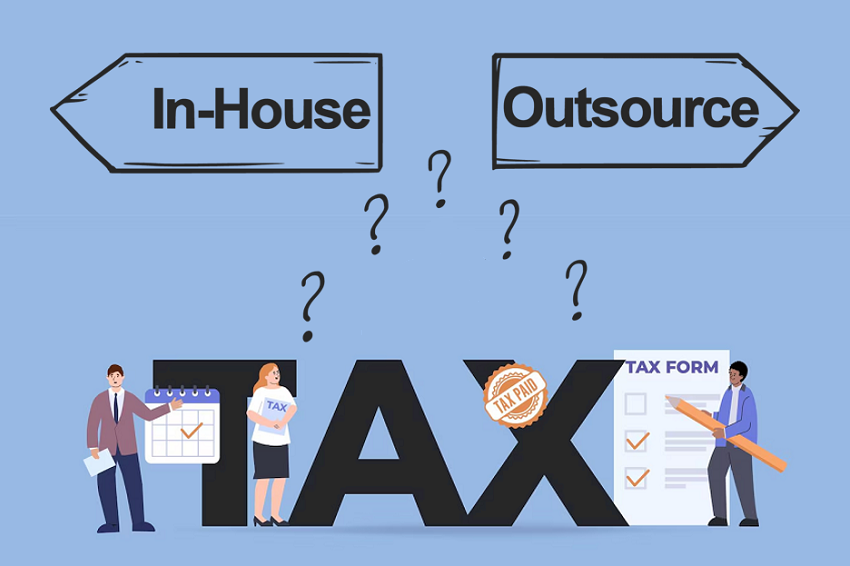There is a need for the business to budget for the tax by carrying forward the profits and also by (tax loss forward) tax planning and preparation for corporate tax purposes. The approach taken regarding these issues can be determinative in the level of implementation of an organization and regulatory compliance. Some organizations keep tax issues in-house and contract the services with experts outside the company in preference to others. In this blog, you can read about what are difference between outsourcing vs. in-house have tax preparation.
The job of gathering all documents and documentation that will assist business owners in making the right decision-making regarding tax implications for their companies is the main function of this job.

Understanding Outsourcing vs. In-house Tax Preparation
Internal tax preparation uses the company’s internal resources to manage every aspect of tax preparation, compliance, and filing.
The most common scenario is having a designated department or team responsible for keeping up-to-date with tax laws, making exact tax returns, and keeping track of compliance with the applicable law.
Tax preparation outsourcing, in contrast, involves transferring these duties to third-party service providers like accounting companies or tax advisors.
They specialize in tax compliance and planning and provide their services to companies through contracts.
Outsourcing may range from delegating tasks like tax return filing to providing comprehensive tax-management solutions.
In the case of tax preparation for businesses, they can choose between managing it in-house or outsourcing the task to third-party service companies.
Internal tax preparation is, together with internal sources, the creation of a specific department or team that manages all aspects of tax preparation, tax compliance, and tax filing.
The process typically entails staying informed with tax legislation, properly making tax returns, and ensuring compliance with applicable laws.
However, outsourcing tax preparation involves engaging third-party service providers, such as accounting firms or tax advisers, to handle tax preparation.
They are tax planning and compliance experts and offer their services to companies through contracts. The scope of outsourcing can be varied, ranging from outsourcing specific jobs such as tax return processing to tax administration services that meet the company’s specific needs.
Pros and Cons of Outsourcing and In-house Tax Preparation
Benefits of In-house Tax Preparation
- Control and Control: The business has direct oversight over the tax preparation process and can closely monitor the timeliness and accuracy of the tax returns.
- Access to Internal Resources: Teams within the company have instant access to finances, data, and staff, which facilitates collaboration and data management.
- Possibility of Cost Savings: If an organization has enough internal resources, in-house tax preparation can be less expensive than outsourcing the work to outside service providers.
Cons of In-house Tax Preparation
- Resource-Intensive: Building and maintaining internal tax capacities requires substantial energy, time, and financial investment. This includes hiring and educating qualified staff.
- Limited Expertise: The in-house team could need more tax expertise and insights from the industry, which could lead to possible compliance gaps or missing opportunities to optimize tax efficiency.
- Risque of Mistakes: Without oversight from outside internal tax preparation, the in-house method of tax preparation has the risk of making mistakes in the tax system, mistakes, or problems with compliance, which could lead to financial penalties, as well as reputational harm.
Benefits of Outsourcing Tax Preparation
- Access to Expertise in a Specialized Area: Outsourcing companies provide extensive tax expertise, experience, and resources, giving businesses access to specialist expertise and excellent business methods.
- Cost-effectiveness: Outsourcing can be an affordable opportunity for companies that need more capacity or experience to handle tax matters internally. Outsourcing can provide an array of pricing options, flexibility, and scalability.
- Efficiency and Technology: Outsourcing companies typically utilize advanced tools and technology to speed up tax processing. Improving workflows, decreasing turnaround times, and improving precision.
Cons of Outsourcing Tax Preparation
- Gain of Control: Tax preparation outsourcing takes control over the process, can restrict access to sensitive financial details, and requires the trust of clients and clear communication with outside service providers.
- Dependence on External Providers: Companies that rely on outsourcing must warrant that they can count on the responsiveness, reliability, and honesty of the vendor they select and establish clearly defined communication channels and service level agreements.
- Possible Cost Considerations: Though outsourcing could bring long-term benefits and savings, the upfront costs, as well as the ongoing costs for outsourcing to external service providers, must be carefully weighed against the advantages and the risks.
Technology and Tools: How They Impact Tax Preparation
In recent years, tax preparation has experienced a lot of changes as a result of new technology and smart tools. From doing everything manually to automated software, the transformation is really huge. This advancement does not only make the process of filing taxes easier but also minimizes mistakes, enhances precision and saves time.
Let’s examine how advancement in technology and tools are affecting tax preparations.
Automated Tax Software
The use of automated tax software is one of the biggest changes that have occurred in the field of tax preparation. As there is always a lack in everything even though they do not know much about taxes, but TurboTax, H&R Block, and TaxSlayer among others have made the procedure quite simple for everyone. These software programs assist users and guide them through the whole process, making sure all-important information is collected and entered correctly. They also provide step-by-step instructions, which helps them to prevent from any type of mistake.
Cloud-Based Solutions
Cloud technology has also made a huge influence on tax preparation. Cloud-based tax tools have now allowed the people and businesses to enjoy complete access to their financial data from anywhere, at any time. This software is really helpful for those who work remotely. It also ensures that data is safely backed up in case of computer issues or any other problem. Thus it reduces the chance of losing it.
Artificial Intelligence and Machine Learning
The use of AI and machine learning bring new technology to the industry for tax preparation. They are capable of quickly scanning huge amounts of data. They can even identify patterns and mistakes that people may not be able to detect quickly and accurately. Moreover, AI-driven tools can provide personalized financial advice on taxes for individuals or businesses considering your specific financial conditions. Such levels of personalization help taxpayers a lot and reduce their amount of tax as much as possible.
E-Filing Systems
Electronic filing system has transformed the way taxes are filed to the government. E-filing is quicker, more effective and more secure as compared to sending forms on paper. It also lessens the need for physical space to store documents and decreases the risk of losing them. One of the best advantage of using e-filing is that it often gives instant confirmation that submission is received which provides a sense of satisfaction to taxpayers.
Mobile Applications
The increase in mobile technology has encouraged the development of tax apps. It makes things even more convenient and brings comfort. Mobile apps like QuickBooks Self-Employed and TaxAct Express allow people to track their expenses, take pictures of receipts, and file taxes by using their smartphones or tablets. These mobile solutions are of great help especially for freelancers, gig workers, and small business owners.
Blockchain Technology
Blockchain technology is newly launched in the market but it holds potential for the future of tax preparation. Its system is decentralized and unchangeable which can provide a clear and safe method for recording and checking transactions. With the help of blockchain technology the risk of fraud is significantly reduced. It ensures that the financial data which is used in tax calculations is correct.
Impact on Tax Professionals
The use of technology and tools in tax preparation has changed the roles of tax professionals. In the past much of the time was wasted in performing manual calculations and entering data but now it has become quite quick just because of these advancements. Now the accountants and tax consultants can focus on strategic guidance and planning. Technology allows them to serve more customers efficiently and with higher quality.
Considerations for Selecting Between Outsourcing vs. In-house Tax Preparation
In evaluating the advantages of outsourcing vs. in-house tax preparation process, firms need to consider various elements to make sure that they align their decisions with their goals and business needs:
- Cost-Benefit Analysis: Complete a cost-benefit analysis that compares the overall cost of outsourcing to in-house production, including direct costs, opportunity costs, and the potential for risks.
- Strategic Alignment: Check that the approach chosen is aligned with the long-term objectives of the business as well as its priorities and resources, taking into account factors like adaptability, flexibility, and essential competencies.
- Risk Management: Review the risks inherent to each strategy, including compliance risk as well as data security issues, operations disruptions, and reputational risk, and develop suitable risk mitigation strategies.
- Resources Accessibility: Check the accessibility and capabilities of internal resources compared to the specialist skills and knowledge offered by third-party providers, considering aspects like staffing or training and technology infrastructure.
- Regulation Compliance: Check that your chosen method allows compliance with rules on taxation, reporting, and standards for the industry, minimizing the chance of being audited and fines and legal obligations.
Risk Management: Outsourcing vs. In-House Tax Preparation
Effective and effective risk management is vital when it comes to outsourcing and corporate tax planning and preparation methods to protect against any potential vulnerabilities and threats:
- Internal Risk Management: Companies that manage internal tax preparation should implement solid internal controls, procedures, and monitoring mechanisms to reduce the chance of mistakes, fraud, and infractions. It can include separating tasks, executing regular audits, and providing regular training and assistance to personnel.
- Outsourcing Risk Management: When outsourcing tax preparation, companies must exercise due diligence and pick reliable, trustworthy companies with a proven track record in high quality, compliance, and security. This could include reviewing the credentials of their references, qualifications, and certificates, in addition to negotiating service-level agreements and safeguarding measures to warrant that accountability and transparency are maintained.
The area of tax preparation management requires internal management to be carried out with strict internal control and processes to be built to manage risk effectively. The procedure includes strong measures such as task-specific assignments, internal daily audits, and constant employee training.
Key Considerations for Small Businesses
If a small business is deciding to choose between in-house or outsourcing experts for their corporate tax preparation, they should focus on the following factors first:
Evaluate Costs and Benefits
First of all, compare the costs of in-house or outsourcing. For example, if you are conducting in-house tax preparation, you have to pay for training your or purchasing software. However, if you outsource an expert, you should remember that you have to pay for hiring them so make sure you have an idea of the complete financial burden in this case.
Assess Internal Capabilities
Check your internal business conditions. If your team does not have knowledge required for tax preparation or handling taxes would be a burden on your resources then it is better to go for outsourcing hiring an expert who can provide the necessary support.
Manage Risks
Remember that both conditions come with risks. If you go for choosing in-house then you must have a strong internal control and do regular checking to reduce the chances of errors. If you choose outsourcing, it is important to select a trustworthy provider and set up clear agreements to manage risks.
Ensure Compliance
Select any method that suits you and your business conditions. However, you have to observe all tax requirements and industry standards in it that will prevent complications. You must avoid legal issues and penalties for this reason.
Pick the suitable approach for your business plan and goals to ensure effective tax preparation.
Conclusion
The decision between outsourcing or in-house tax preparation is an important choice that demands careful analysis of the various aspects and trade-offs.
Although both methods have advantages and disadvantages, there is only a partial solution. Business owners must consider their needs, priorities, and risk tolerance to identify the most appropriate method to meet their corporation’s tax requirements.
If they decide to use in-house resources or outsource to third-party service providers, companies should consider effectiveness in accuracy, precision, compliance, and risk management to ensure the tax issues are dealt with.
Companies can manage complex tax issues and optimize tax strategies to achieve their financial objectives with the proper mixture of internal resources and outside expertise.


